What Causes Lazy Blue Flame on Propane Heater
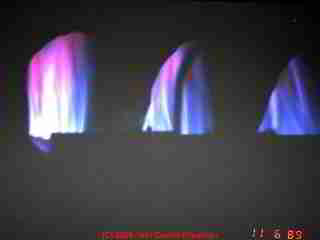 Gas Appliance or Gas Heater Flame & Noise Defects
Gas Appliance or Gas Heater Flame & Noise Defects
- POST a QUESTION or COMMENT about gas burner operating problems: flame defects, noises, safety hazards
InspectAPedia tolerates no conflicts of interest. We have no relationship with advertisers, products, or services discussed at this website.
Gas burner operating defects & noises:
Here we provide descriptions and photographs of unsafe gas piping, indications of unsafe or improperly operating gas appliances, gas meters, and other gas installation defects are provided.
We discuss how to diagnose and how to report defects found in oil or gas piping inspections. We include inspection report language examples for gas heating appliance flame & noise problems & hazards.
This article includes example home inspection or gas appliance inspection report language for reporting defects in gas piping & burner operation at heaters, ranges, ovens, water heaters or similar LP, propane, or natural-gas fired appliances.
We also provide an ARTICLE INDEX for this topic, or you can try the page top or bottom SEARCH BOX as a quick way to find information you need.
Gas Flame & Noise Defects
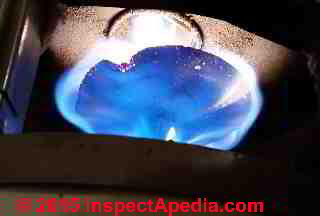 How to Identify & Report Other Defects in LP or Natural Gas Appliances by Examining the Gas Burner Flame or Burner Noises
How to Identify & Report Other Defects in LP or Natural Gas Appliances by Examining the Gas Burner Flame or Burner Noises
Gas Burner & Flame Color Interpretation
[Click to enlarge any image]
Our gas flame colour illustration at page top illustrates a questionable irregular gas flame at the burner of a gas-fired heating furnace.
Looking into three burner ports of this heater we see three very different burner flames, suggesting perhaps a debris-blocked burner tube or improperly-adjusted air shutters, or (less likely) a partly-blocked gas metering orifice.
Above we see the gas flame in a Cal-o-Rex Dur-A-Glas LP gas fired water heater installed in Pozos, Guanajuato. This water heater (geyser) was made in 1999 so we're looking at a water heater gas burner after sixteen years of use.
The photo offers a view of a damaged gas burner flame dispersing cone and also of the passage of gas combustion products up through the center flue of this calorifier. The flame colours are normal, mostly blue with yellow tips.
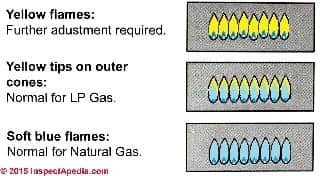
Our gas flame colour illustration shown above, adapted from Bosch (2014), shows how you might distinguish among the properties of the following:
- Unhealthy, mostly-yellow gas burner flames (top, check the gas regulator and air mix) that can occur on either LP (or propane) or natural gas burners.
Also see GAS REGULATOR NOISES as problems with gas-air mixture can cause noise at the appliance regulator as well as defective gas flame or too-low gas flame.
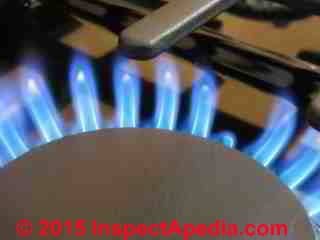
- Healthy yellow tips on outer cones of otherwise blue flames (center) characteristic of LP or propane gas burner flames such as is illustrated in the photograph shown above
- Healthy soft blue flames of a natural gas burner shown below (the small gap in flame tips at the 12-o-clock position in the photo marks the location of the igniter - and is not a defect.
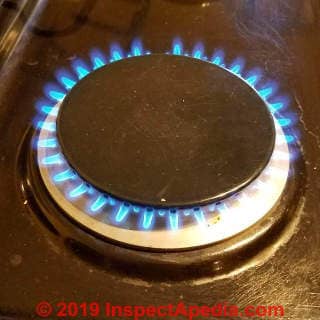
What the Bosch drawing and our photos above do not show are other gas burner flame defects such as noises, flame lifting off of the burner, flame jumping excessively, flame uneven, or blocked at some orifices by debris or spills or lastly and particularly dangerous, the presence of soot - an indication of a serious even fatal carbon monoxide hazard.
Above we see a normal LP gas flame at the burner of a gas stove installed in Poughkeepsie, NY.
Also see GAS FLAME COLOR CHECK for more examples of gas flame color checks and the relationship between air mix and gas flame.
Other Example Gas Burner Inspection Points & Reporting Language
*** Safety Recommendation: gas grill we suggest keeping the gas turned off at the rubber hose connection below the rear deck as leaks could be very dangerous.
The use of rubber tubing rather than iron piping is unsafe and may not be permitted for this installation, and we suggest you review this question with your local fire inspector. Usually this is not a significant expense if correction is needed. This item should be addressed promptly.
Gas Appliance Flame Observations: Caution: examining the burner when this appliance was operating we noted that the flame was floating above the burner ports.
You should check with your utility company or heating appliance service person. Possible causes include high gas pressure, clogged flue, inadequate air supply, excessive or very cold drafts.
Gas Appliance Flame Observations & Reporting checklist: [Example heating system inspection report text is below]
Caution
At the ___ appliance, the gas burner flame was [example gas flame defects]
___ burning at the gas metering orifice
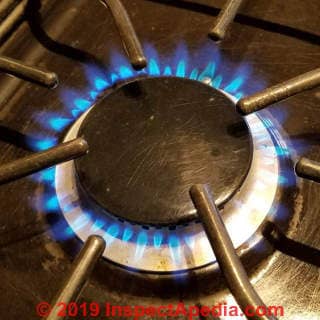
___ lifting off of the flame from the burner, possibly gas pressure too high - photo above - often accompanied by a rushing or roaring noise.
___ popping noise when turned off and on - see GAS BURNER POPPING NOISES
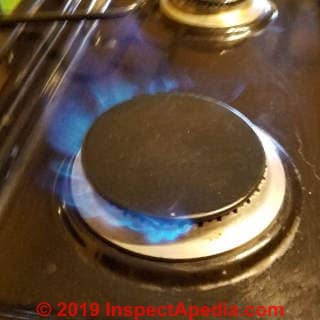
___ gas burner roaring noise and un-stable flame, flame too big, unusually high, noisy flame, possibly burner cap askew or gas pressure too high or both.
___ gas flame spilling out of the burner area
___ gas burner flame yellow and lazy [inadequate gas pressure or inadequate combustion air],
indicating a possible malfunction of this equipment.
Watch out: Any of these LP gas , propane, or natural gas burner conditions is potentially very dangerous and needs prompt attention. You should have your utility company or service person check the appliance immediately.
Immediate LP or natural gas safety hazards : if there is evidence of an LP or natural gas leak at a building, gas odors, for example, you should:
- Do not do anything that is likely to cause a gas explosion, such as lighting a match, operating an electrical switch, or even using a telephone in the building
- Leave the building immediately
- Notify other building occupants of the safety concern
- Contact the local gas company and/or fire department
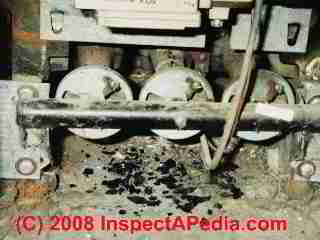
Watch out: General safety warning: improper installation and even improper inspection and testing methods involving natural or "LP" gas can involve dangerous conditions and risk fire or explosion.
If you smell gas you should leave the building immediately and should do so without doing anything that could create a spark such as operating a light switch or telephone. From a safe location, call your gas company's emergency line and/or your fire department.
Watch out: soot observed on or around an LP or or natural gas burner can be a sign of extreme danger. Normally gas fired appliances run rather clean and with no soot deposition.
But if there is a combustion air problem a system can soot up and even completely clog a flue with soot very quickly - in minutes or hours. The risk is potentially fatal carbon monoxide poisoning of building occupants.
The text provided here is a working draft and may be incomplete or inaccurate.
Contact us to suggest text changes and additions and, if you wish, to receive online listing and credit for that contribution.
NOTICE: while example report language is provided here, reproduction of this or any of our web pages or their contents at other websites or in printed documents for sale is prohibited.
What should a gas furnace or boiler gas burner flame look like?
When properly adjusted the gas burner for a 100,000 BTU gas furnace or gas boiler, will have a flame about 1" or so high. The top of the gas flame will roll slightly 90 deg across and be blue in color.
If the gas pressure is too high you will notice the tips of the flame much higher, pointed and orange in color. The orange gas flame color usually means there is too much gas for the air mix input. [Dust, debris, or other problems in the gas/air mix ratio, such as a misadjusted or blocked air intake at a gas
More about gas flame color and diagnostic suggestions is
at BLUE vs YELLOW COMBUSTION FLAMES and
More about the relationship between flame colour when burning oil or gas fuel is
at COMPLETE COMBUSTION, STOICHIOMETRIC
What does the presence of rust or debris mean when found on a gas burner?
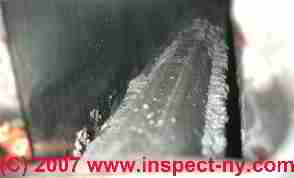
Excessive rusting every year usually accompanies these problems of improper gas pressure, inadequate combustion air, or wet conditions.
If you vacuum a lot of rust one year and it is back the next, then there is a problem that needs to be diagnosed and corrected.
Watch out: Rust can damage a heat exchanger, cause a hole, and make the heater unsafe.
Rust can also indicate general moisture conditions that could be causing other damage to or safety problems with the heater, including flue or chimney safety hazards.
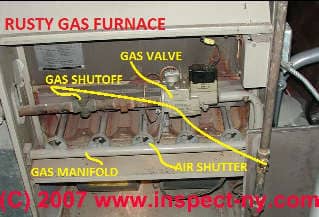
Looking for rust on a gas heater's burner is a simple, quick visual check anyone can do to see if there is cause for alarm.
If rust is recurrent as we describe, further inspection is needed, and the gas pressure regulator should be checked as well.
Some of the residential gas furnaces or gas fired boilers show the correct flame patterns in their Installation and Operation Manuals.
Thanks to Charles or Mike Trumbature for suggesting this comment:
I see mostly Rheem furnaces in homes 20 - 30 years old. Rheem(TM) must have cornered the market at that time here in the Houston Texas area.
I've seen several homes in various areas with the same identical furnaces. I replaced a thermocouple on a relatively new unit once and noticed the "tame" flame pattern compared to my raging bonfire in my own furnace which was an older unit.
On my older gas furnace I was constantly cleaning out rust every year. That's when I checked the gas pressure at the gas regulator/valve and found it too high. My friend's heat exchanger still looked new, mine was a bucket of rust.
Readers should also
see WATER HEATER NOISE DIAGNOSIS, CURE
Cause & Cure for Popping Noises at Gas Burners
This discussion has moved to
GAS BURNER POPPING NOISES
Watch out: these LP gas , propane, or natural gas burner conditions are potentially very dangerous and needs prompt attention. You should turn off the fuel supply to any gas appliance expected of leaking - to reduce the risk of a catastrophic gas explosin.
Gas Burner High Altitude Burner & Equipment Instructions + Manuals & Gas Flame Defects
This topic has moved to GAS APPLIANCE OPERATION at HIGH ALTITUDE
Reader Q&A - also see the FAQs series linked-to below
If no one has changed the flame or air shutter adjustment then I would be looking for a partial blockage or debris on the burner or at the gas orifice.
Floating flame on center element of dyna glo. The other two elements are okay , no flame above element.
The center element is the main element. It is on all the time the heater is on.
Carol
With the apology that we can diagnose your heater from just the information in your message, I agree that it sounds dangerous. There may be at least two hazards involved, a gas leak and an overheating problem.
I think the system needs to be professionally inspected and adjusted and of course tested for leaks. If it were mine I would leave it off until I could have that done.
I have a Mr. heater 30,000 BTU propane wall heater that started to flare up when it tries to light it also has started to give her an unpleasant odor seems to happen when I have it turned up on a higher setting more I've cleaned it I've checked everything it's only seven months old and only used probably four of those months
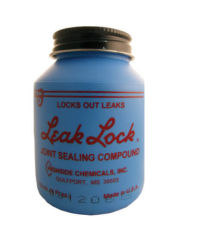 Gary
Gary
I'd be nervous about that gas leak too as we can't be sure that at some later time you won't ignite a bolus of leaked gas, causing an explosion.
I would check and re-make each of the gas fitting connections with great care not to make matters worse by stripping the threads of brass or other fittings.
Use a thread sealant such as the Blue Leak Lock from Supco that I show below
- rated for use on gas fittings.
I have a home brew system that uses 3 "Chinese Wok" 10 jet burners connected to a natural gas source.
The jet tips are screwed into a cast iron "ring" that connects to a gas line. I noticed that sometimes the blue flame at the tip of the brass jet travels back to the base of the jet where the air holes for mixture are.
Is this a potential explosion hazard? I have never noticed this before and have been using this system for years. Thank you.
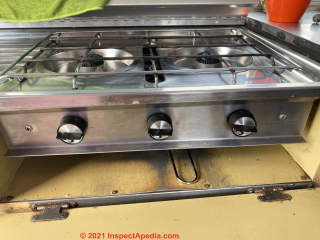 If this has not always been a problem I'd look for low fuel or a blockage that can be cleaned.
If this has not always been a problem I'd look for low fuel or a blockage that can be cleaned.
I have a 1978 Ci Motorhome with a Flavel hob/grill built in.
The grill works fine. The hob rings either side (as far as gas delivery rail is concerned) are very low and sometimes gurgle. The flames are totally blue however.
The jets dispense the gas into an open 'funnel' type opening that then goes along and up through the ring that is bolted in place so no loose caps etc.
Any help much appreciated as I cannot replace the unit as it is part of a sink/hob/drainer arrangement.
Wrong jet or gas metering orifice, wrong gas pressure or fuel type,
I have a small cylinder gas heater with a screw on top, when I open the gas and ignite it, it makes big flames,what can be the problem?
Bert
Without knowing anything about your system or where the noise appears to originate, I can't give a useful answer about why your new heating system is noisy.
Watch out, however, If it appears to you that the noise is actually at the burner or burner Flame. The condition could be dangerous. If that's the case, I would turn the system off and call the installer for an immediate. Service and repair
why is my new American Standard nat. Gas furnace burner very noisy and disruptive.
Leo
If the primary air supply into a gas burner is excessive that can cause a gas burner to ignite inconsistently, noisily or with a rushing noise.
Too much primary air can be caused by a problem with the LP or natural gas supply: gas pressure is too low.
That in turn can be caused by a sticking or defective gas pressure regulator or (rarely) by very cold weather and an LP gas tank that is nearly out of fuel.
Or, less common, there could be a defective gas valve itself.
Do you think perhaps the gas valve is improperly regulating and releasing gas into the burner? If so I'd consider that dangerous and I'd replace the valve.
I have never seen this before. One in maybe 40 startups of a LP gas heating stove (looks like an old fashioned wood burner) results in a loud rushing gas sound. The flame appears normal, only the sound is different. If the stove flame is extinguished and restarted via the thermostat then the roaring sound is gone.
The thermocouple voltage is on the low side, but it still keeps the pilot light lit. That's the only thing that appears even remotely less then how it should be.
Any ideas?
Got it. Can you tell me
the heater brand and model
age
country and city of installation?
Perhaps post a photo using the "add image" button
so I can take a look at what the manufacturer says
Thanks for the link but doesn't address my issue. I have a wall mounted vent free unit. It works fine until I turn to 3 brick and then any breeze causes issues.
It's almost as if air gets around the 3rd brick. Guess I'll take it somewhere to have looked at.
Walt you posted and we replied at https://inspectapedia.com/plumbing/Gas_Orifice_Conversion_LP_NG.php
spuds #93 #100 #108 go where or the larger the # the smaller the burner top ?
Todd
I have a 3 brick wall mounted propane heater. When I turn it to 3 bricks the slightest breeze cause the heater to make a loud whoosh and then the bricks have a flame instead of the red glow. Is there something that I can do to fix this?
I've seen this puffing problem at gas log fireplaces too and on occasion traced it to a faulty regulator or dust. dirt, debris in a gas orifice. Try thorough cleaning of all of the parts.
One of the gas burners on my (almost) new Bosch cooktop makes a "puffing" sound when it is turned on. There is a constant flame, but it puffs every couple of seconds. I thought might be air in the line, and I let it run for a minute, but the puffing noise continued. Now I'm afraid to use it. Any ideas?
my gas burner always gets off when i switch it onto sim
I have an outdoor propane "wood" burning fire pit. I purchased a new propane tank because the burner wouldn't light. Despite the new tank, it still will not light. I briefly smell gas but then nothing. Any suggestions? The burner was outside throughout the winter...covered on my deck.
I have an outdoor propane "wood" burning fire pit. I purchased a new propane tank because the burner wouldn't light. Despite the new tank, it still will not light. I briefly smell gas but then nothing. Any suggestions? The burner was outside throughout the winter...covered on my deck.
I have a constant humming noise resonating through my house. It feels like a vibration.It is driving me crazy,and has been going on for years. It is not electric. I had the plumber out,he drained all the faucets,no luck.I have well and septic and an underground propane tank for heating and cooking. Please help.
Not that I've come across, John.
I'd take a different approach. Find the actual cause for the noise that is bothersome. If that proves to be abnormal the there is a problem with the equipment to find and fix. The noise could indicate a coming equipment failure or even an unsafe condition.
Keep us posted.
Is there a muffler or noise reduction part for the vent of a gasfurnace
Anon,
With the caveat that no one can make a complete safe assessment of a building and its mechanical systems based on a simple text query such as that we have below. It is often the case that an expert will observe conditions that are not so apparent to normal building occupants.
The article above cites and I re-mphasize that a change in gas flame color or odors as you describe are warning signs of improper combustion. The root problem could be trivial - dust on burners - or it could be very serious.
The danger is possibly fatal - death - in particular IF a gas fired appliance is producing carbon monoxide.
IF you have carbon monoxide detectors (CO detectors) properly installed, located, and working, and if those alarms have not sounded, then the risk assessment, while certainly not zero, is most likely less.
The safe course of action would be to turn off the equipment and call for help from your heating service company.
my gas fires flames are burning bright orange , plus i,ve noticed a very strong sulphur smell coming from it every time i switch it on is this dangerous please ?
...
Continue reading at GAS BURNER POPPING NOISES or select a topic from the closely-related articles below, or see the complete ARTICLE INDEX.
Or see GAS BURNER FLAME NOISE & DEFECT FAQs - questions & answers posted originally at this article
Or see these
Recommended Articles
- BANGING HEATING SYSTEM NOISES
- BLUE vs YELLOW COMBUSTION FLAMES
- COMPLETE COMBUSTION, STOICHIOMETRIC
- CONVERT the GAS ORIFICES - change between LP Propane & Natural Gas; changes for high altitude gas appliance or heater operation
- GAS APPLIANCE CONVERT LP-to-NATURAL GAS
- GAS APPLIANCE OPERATION at HIGH ALTITUDE
- GAS BURNER FLAME & NOISE DEFECTS
- GAS BURNER POPPING NOISES
- GAS BURNER RUMBLING CHUGGING NOISES
- GAS FIRED WATER HEATERS
- GAS REGULATORS & APPLIANCE / HEATER CONTROLS - also need adjustment for tall buildings or high altitude
- GAS IGNITER DIAGNOSIS & REPAIR
- GAS PRESSURES LP vs NATURAL GAS
- GAS PRESSURE vs BUILDING HEIGHT - LP or propane fueled equiopment djustments needed to allow for altitude?
- GAS REGULATORS & APPLIANCE / HEATER CONTROLS
- GAS REGULATOR NOISES - buzzing, humming, and other noises at gas appliance regulators
- NOISE / SOUND DIAGNOSIS & CURE - home
- WATER HEATER SCALE DE-LIMING PROCEDURE
Suggested citation for this web page
GAS BURNER FLAME & NOISE DEFECTS at InspectApedia.com - online encyclopedia of building & environmental inspection, testing, diagnosis, repair, & problem prevention advice.
Or see this
INDEX to RELATED ARTICLES: ARTICLE INDEX to GAS APPLIANCES, PIPING, CONTROLS
Or use the SEARCH BOX found below to Ask a Question or Search InspectApedia
...
Ask a Question or Search InspectApedia
Questions & answers or comments about gas burner operating problems: flame defects, noises, safety hazards.
Try the search box just below, or if you prefer, post a question or comment in the Comments box below and we will respond promptly.
Search the InspectApedia website
Note: appearance of your Comment below may be delayed: if your comment contains an image, web link, or text that looks to the software as if it might be a web link, your posting will appear after it has been approved by a moderator. Apologies for the delay. Our Comment Box is provided by Countable Web Productions countable.ca
Technical Reviewers & References
Click to Show or Hide Citations & References
Source: https://inspectapedia.com/plumbing/Gas_Flame_Noise_Defects.php
Post a Comment for "What Causes Lazy Blue Flame on Propane Heater"